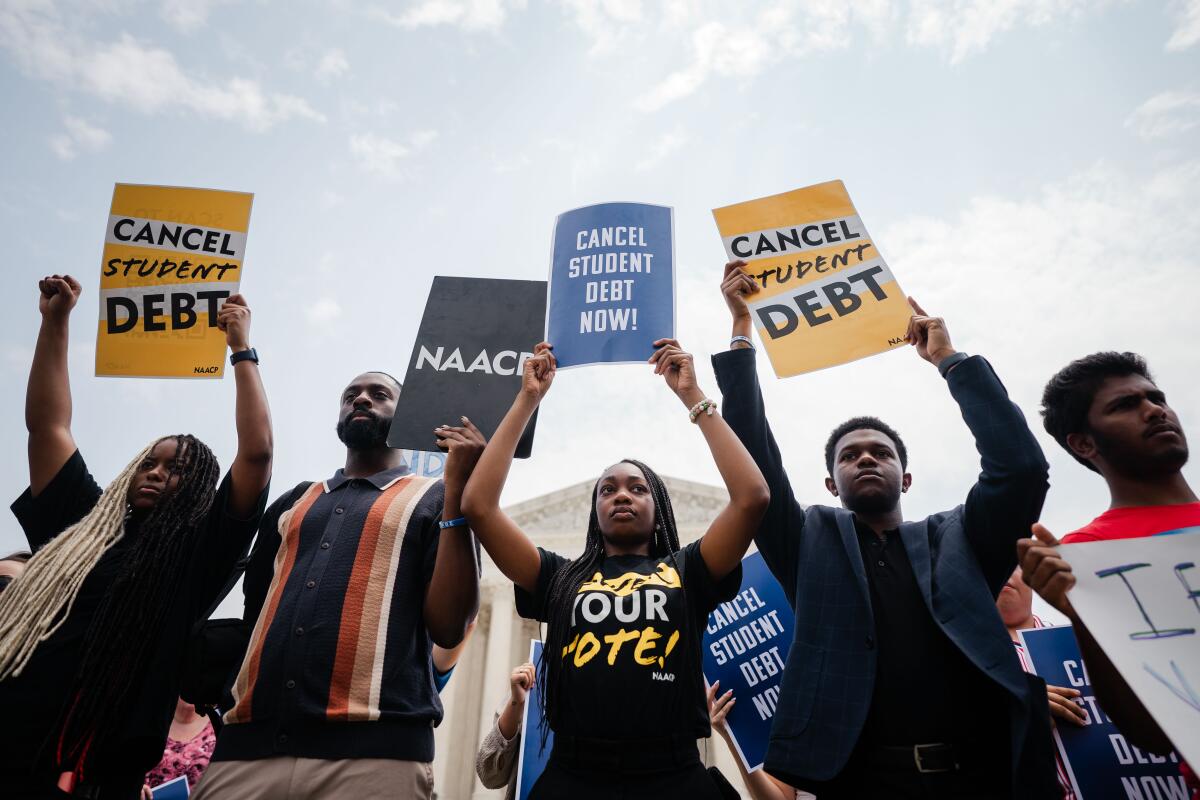Column: Why blocking Biden’s student loan forgiveness plan is healthy for politics

- Share via
Last week, the Supreme Court scuttled the Biden administration’s attempt to forgive more than $400 billion in student loan debt.
As a matter of policy, broad-based student debt cancellation remains a terrible idea for a host of reasons.
While targeting relatively small debts held by lower income community college graduates is more defensible, sweeping student debt forgiveness is regressive, rewarding people with an asset — a college or graduate degree — who are better equipped to pay it off than other debt-burdened Americans.
At a time when the government was fighting inflation (it still is), it was “reckless” — in the words of Obama administration chief economist Jason Furman — to pump billions into the economy.
Finally, it’s counterproductive on its own terms. The debt payment moratorium, implemented by the Trump administration and extended by Biden, has led to more borrowing. According to a University of Chicago study summarized in the Economist, “the pause in student-loan payments caused borrowers to rack up more debt, not less.”
But if Democrats want to ignore economic reality and reward a key constituency by having other people pay their debts, they’re free to do so. There’s just one hitch. Congress needs to do it.
In 2021, Joe Biden questioned how much authority he had to cancel student debt “by signing with a pen” and then-Speaker Nancy Pelosi said he didn’t have the authority to do that. But under intense pressure from the left of their party, they reversed course. They discovered a ridiculous pretense under the 2003 Heroes Act and reversed the Department of Education’s standing opinion.
Fortunately, the Supreme Court upheld the constitutional separation of powers. Congress, not the president, has the power of the purse.
“If my fellow citizens want to go to Hell,” Supreme Court Justice Oliver Wendell Holmes Jr. famously said, “I will help them. It’s my job.”
Holmes’ reputation as a philosopher-jurist and civil libertarian has long been in need of a sharp revision. Holmes was a majoritarian, and because he was a jurist during the Progressive Era, his judicial restraint — a refusal to strike down government actions during a time of government expansion — was admired by those seeking to expand the government.
But Holmes had a point. It’s not the Supreme Court’s job to stop politicians and the voters who elected them from making bad decisions so long as they don’t violate the Constitution in the process.
The problem is that after decades of the judicial and executive branches doing Congress’ job — often at the behest of a dysfunctional Congress unwilling or unable to live up to its responsibilities — judicial restraint is now seen as judicial activism. The court didn’t rule that student debt can’t be forgiven; it merely said that government has to do it right or don’t do it at all.
Whatever you think is the right policy on student debt, I think this is very good news for our politics. The accumulation of power in the presidency has fueled polarization by making presidential elections look like parliamentary elections in which new presidents have sweeping authority to do whatever they want. But our constitutional order is not designed for these kinds of zero-sum politics. The presidency is not equipped to legislate.
Executive orders can be reversed by the next executive. Because the bases of both parties don’t know or care about how policy ends are achieved, every new administration swings for the fences, trying to do as much as it can get away with, to the cheers of their partisans in Congress and media. And they’re soon swept from power as a result.
Hence the great paradox of American politics today: You can get what you want if you win more elections, but to win more elections, you need to ask for less.
This cycle of overreach and correction was made possible by a Supreme Court that has long turned a blind eye to the separation of powers.
The shift toward a better politics may have already begun. On Monday, Vice President Kamala Harris told NPR, “Look, we have three branches of government. The court took rights from the people of America. Congress can put those rights back in place. We cannot through executive action. Congress can.”
More to Read
A cure for the common opinion
Get thought-provoking perspectives with our weekly newsletter.
You may occasionally receive promotional content from the Los Angeles Times.











